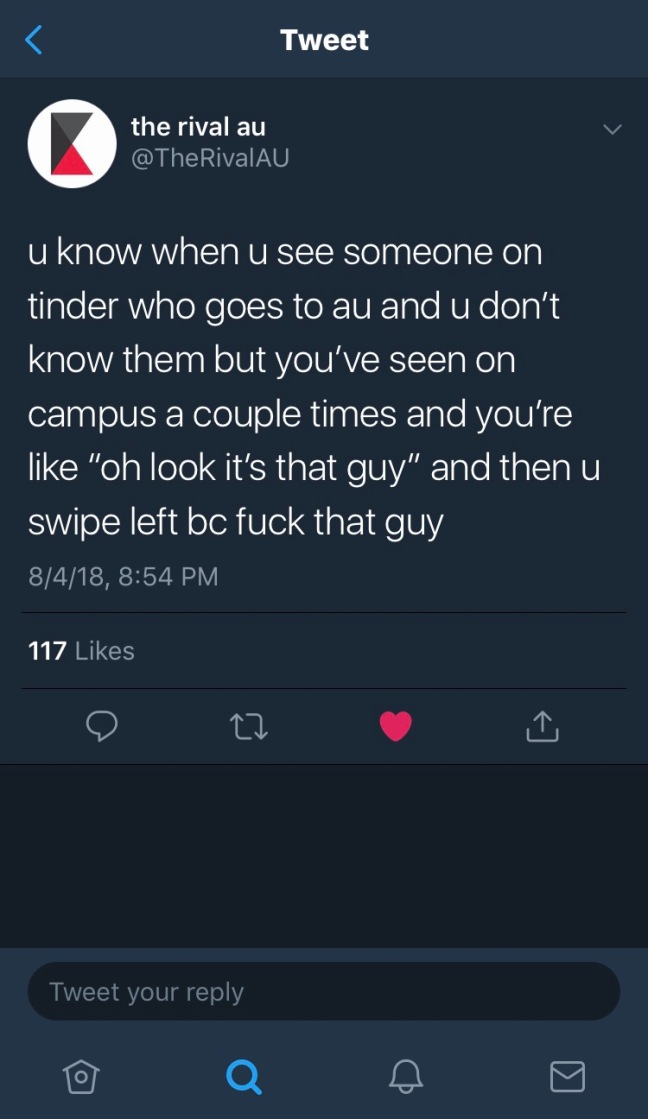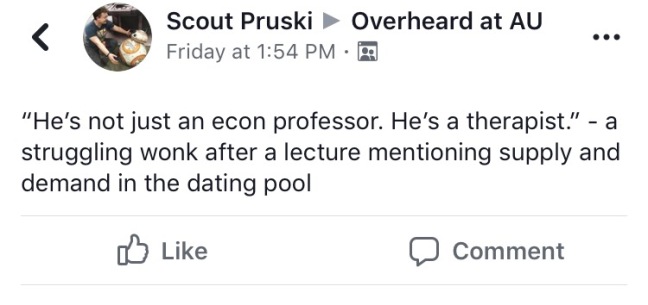The students of American University are no strangers to raspberry blushed cheeks and side-eye glances reserved for “the morning after.” In fact, it is something they encounter nearly every Sunday morning walking around the Terrace Dining Room to get an omelet and potatoes— still in their clothes from the night before. The undergraduate population of AU is a rather small number of 7,901 students, so it is not very hard to bump into that one person who you were hoping not to see.

Joshua Alem, 19, sits cross-legged on a teal cushion chair in The Bridge, a trendy coffee cafe located on American University’s campus. He discusses his dating preferences and makes clear his mantra of “we’re young, so we might as well do it now,” as a means to offer explanation for him and his friends experiences thus far. He is mostly referring to those acts of intimacy, commonly referred to as “hooking up”, that many students are hesitant to talk about or even get involved in. Last year Alem recalls asking himself often if he was living within the typical “college American lifestyle”— whatever that may be.
More explicitly, he says “there is some sort of pressure to keep up with the endeavors of my peers just for the reason that I want to relate to them,”he gestures to a group of students sitting across the coffee shop, “you know, it’s nice to feel like you have a seat at the table when everyone is talking or laughing with each other about what happened at last night’s party or something like that.”
Basically, he is looking to do everything that he is “supposed” to be doing—that is according to his friend circle and popular movies like “Palo Alto” where rowdy, and in some cases righteous, teens release unprecedented angst to gain juvenile clout (usually in a sexual manner.)
Eduarda Serafim for example, does not feel this kind of pressure on campus. Prior to arriving on AU, she had expectations of a college culture similar to the kind described by Alem. She knew this immediately and admits to “being open to developing new relationships in college.”
The 18-year-old freshman makes clear “as long as I remain within my bubble or group of friends, I don’t feel the need to keep up with the other kids here.”
Serafim is a member of the honors college at AU and lives within a Living Learning Community (LLC) in Anderson Hall. She says that the type of people she surrounds herself with make it easier to focus more on school and exploring Washington than on what she may be missing out on if she gave in to peer pressure and participated in things she felt reluctant about.
While the thought of exploring more partners certainly does cross her mind, especially after attending a party or an event where activities become much more raucous or impulsive, she said she can always look to her group of friends to keep her grounded.
Intimacy is a complex topic that requires an agreement among two or more individuals—whether that agreement be platonic or romantic is up to those involved. Both Alem and Serafim define intimacy as something along the lines of existing only behind closed doors. More in depth, they refer to intimacy as having implications and understandings that could only be truly felt if you are a member of that specific relationship. Essentially, intimacy is different for every person so it is important to maintain what you individually applaud before committing to something. Dr. Laura Herron, a member of the University’s Counseling department, touches on this subject when she says “As students figure out their values and which behaviors work for them, feelings related to peer pressure tend to dissipate.” In addition to this, Dr. Herron suggests group therapy as a mechanism to “allow students to better understand how they relate to others and shift behaviors they might be dissatisfied with.” 
Dr. Herron said “It really depends on the person and their preferences and values. Some students prefer to have one partner, while others identify as polyamorous, for example, and maintain more than one intimate relationship at a time. There are many ways for people to have their needs for intimacy, connection and closeness met. If a student finds that having casual hook ups does not fulfill their needs, I would advise that person to seek alternate ways to meet those needs.”
Serafim also offers some consolation when she says with a soft smile and deep dimples “breaking out of your shell can be the hardest thing someone does in college, but everyone is either going through it or has gone through it. You are never alone on this campus and our school has so much to offer, so just be who you want to be and you will definitely find your community somewhere.”
xoxo,
Vanessa M. – finess5

